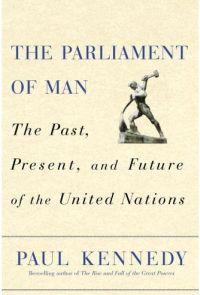

Purchase
The Past, Present, and Future of the United Nations
Random House
June 2006
384 pages
ISBN: 0375501657
Hardcover
Add to Wish List
Non-Fiction | Non-Fiction Political
"With all its defects, with all the failures that we can
check up against it, the UN still represents man's
best-organized hope to substitute the conference table for
the battlefield."
- Dwight D. Eisenhower, 1961 The signing of the United Nations Charter in 1945 was an
unprecedented development in the history of humankind. For
the first time, the world's most powerful sovereign nation
states came together to create an autonomous organization
designed to, in the Charter's words, "save succeeding
generations from the scourge of war [and] reaffirm faith in
fundamental human rights." Sixty years later, the UN still
doggedly pursues that mandate, albeit not without difficulty
and certainly not without criticism. In The Parliament of Man, the distinguished scholar Paul
Kennedy gives a thorough and timely history of the United
Nations that explains the institution's roots and functions
while also casting an objective eye on the UN's
effectiveness as a body and on its prospects for success in
meeting the challenges that lie ahead. Building on expertise he gained in drafting official reports
for the UN's fiftieth anniversary on how to improve the
organization's performance, Kennedy makes sense of the many
commissions and committees, and how its six main operating
bodies - General Assembly, Security Council, Economic and
Social Council (UNESCO), Trusteeship Council, Secretariat,
and International Court - operate and interact. Citing
examples from the UN's history, he shows how the five
permanent members of the Security Council - the United
States, the United Kingdom, Russia, China, and France - on
numerous occasions overcame political antagonisms to
spearhead military supervision of aid in humanitarian
crises, and how lack of cooperation among the great powers
has hamstrung such initiatives as the control of greenhouse
gas emissions and exacerbated the deleterious effects of
globalization on developing nations' economies. As a body, the UN emerges here for what it is: fallible,
human-based, oftentimes dependent on the whims of powerful
national governments or the foibles of individual senior UN
administrators, but utterly indispensable. In The Parliament
of Man, Kennedy ably proves that "it is difficult to imagine
how much more riven and ruinous our world of six billion
people would be if there had been no UN social,
environmental, and cultural agendas - and no institutions to
attempt to put them into practice on the ground."
Comments
No comments posted.
Registered users may leave comments.
Log in or register now!
| 


 © 2003-2025 off-the-edge.net
all rights reserved Privacy Policy
© 2003-2025 off-the-edge.net
all rights reserved Privacy Policy